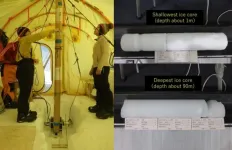(Press-News.org) Researchers have successfully developed a new Strep A human challenge model, paving the way to test vaccines against the common deadly bacteria that causes sore throats, scarlet fever and skin sores.
The collaborative research effort, led by the Murdoch Children's Research Institute (MCRI) and published in The Lancet Microbe, found the model, which deliberately infected healthy adult volunteers with the bacteria in a controlled environment, was safe and would now be used to trial Strep A candidate vaccines.
Strep A infections affect about 750 million people and kill more than 500,000 globally every year - more than influenza, typhoid or whooping cough. Strep A can also cause severe life-threatening infections like toxic shock syndrome and flesh eating disease and post-infectious illnesses such as acute rheumatic fever, rheumatic heart disease and kidney disease.
Strep A infections disproportionately affect young children, the elderly, pregnant women and Indigenous Australians. There is currently no vaccine available to prevent Strep A and can only potentially be treated with antibiotics.
MCRI'S Dr Josh Osowicki said given Strep A only naturally infected humans, researchers were limited in what they could learn in the lab and using animal models.
"Human challenge models can be used to test vaccines, drugs and diagnostic tests, as well as driving all sorts of wonderful scientific collaborations to understand more about how diseases work and how to stop them," he said.
"We have developed the only current Strep A controlled human infection model, ready to be used as a platform to evaluate new vaccine candidates and therapeutics."
Dr Osowicki said the research team tested a Strep A strain they believed would cause a strep throat and was unlikely to cause acute or chronic health problems.
The study involved 25 volunteers, aged 18-40 years who stayed at Nucleus Network, a phase 1 clinical trials unit based in Melbourne for up to six days with blood tests and saliva and throat swabs collected regularly.
Dr Osowicki said 85 per cent of participants developed a convincing case of strep throat, well up on the at least 60 per cent anticipated.
"Starting at one-tenth of the dose used in old 1970s studies, we applied our special Strep A strain on the back of each participant's throat," he said. "To our surprise, from the very first participant at the low starting dose, our strain caused strep throat in most participants."
The volunteers developed mild to moderate symptoms including a sore throat, sweats, fever and headache. All quickly recovered and were followed up for six months after they were sent home, according to the study.
Melbourne resident Tania O'Meara's daughter Eden was just 11 months old when she almost lost her leg to a flesh-eating bacterial infection caused by Strep A.
"We put our daughter to bed with what seemed like a cold but the next morning she woke up with a fever and was very pale, limp and dehydrated," she said.
"We took her to the hospital but the doctor couldn't get the IV drip in because Eden was so dehydrated and they were forced to drill it into her leg. They also noticed that the skin on her leg looked like it was turning a different colour."
Ms O'Meara said Eden required surgery on her right calf to remove the dead flesh.
"We were told that she could die and we braced ourselves so it was a miracle that they were able to save her leg and even her calf muscle," she said.
Eden, now three, needed three more surgeries and has since made a full recovery.
Ms O'Meara said she was relieved that a vaccine for Step A may not be too far away.
"I don't want any other family to experience what we went through. It is an absolute tragedy that this bacteria is cutting so many lives short," she said.
MCRI Professor Andrew Steer said the team expected to start testing candidate Strep A vaccines developed by researchers in Australia and overseas before the end of the year.
The trials, to be conducted in Melbourne, would involve about 50 participants receiving a candidate vaccine or placebo and having the Strep A challenge strain applied on their throats.
"The global burden of Strep A is an unmet public health challenge. We hope this research will accelerate the development of a vaccine and move things forward to bigger field trials," Professor Steer said.
"A vaccine for Strep A will save hundreds of thousands of lives every year and prevent millions of infections that send children and adults to the hospital or doctor."
INFORMATION:
Researchers from the University of Melbourne, The Royal Children's Hospital, Université Libre de Bruxelles in Brussels, Monash University, Griffith University, The University of Tennessee, The University of Queensland, Oxford Vaccine Group and Telethon Kids Institute also contributed to the study.
Publication: Joshua Osowicki, Kristy I. Azzopardi, Loraine Fabri, Hannah R. Frost, Tania Rivera-Hernandez, Melanie R. Neeland, Alana L. Whitcombe, Anneke Grobler, Sarah J. Gutman, Ciara Baker, Janet M.F. Wong, Jason D. Lickliter, Claire S. Waddington, Manisha Pandey, Tibor Schuster, Allen C. Cheng, Andrew J. Pollard, James S. McCarthy, Michael F. Good, James B. Dale, Michael Batzloff, Nicole J. Moreland, Mark J. Walker, Jonathan R. Carapetis, Pierre R. Smeesters and Andrew C. Steer. 'A controlled human infection model of Streptococcus pyogenes pharyngitis: an observational, dose-finding study (CHIVAS-M75),' The Lancet Microbe. DOI: 10.1016/S2666-5247(20)30240-8
*The content of this communication is the sole responsibility of MCRI and does not reflect the views of the NHMRC.
Available for interview:
Dr Joshua Osowicki, MCRI Tropical Diseases Research Group
Professor Andrew Steer, MCRI Theme Director, Infection and Immunity
Tania O'Meara, mum of Eden, 3, who had a flesh-eating bacterial infection caused by Strep A
A complicated interaction between different proteins is needed for information to pass from one nerve cell to the next. Researchers at the Martin Luther University Halle-Wittenberg (MLU) have now managed to study this process in the synaptic vesicles, which play an important role in this process. The study appeared in the journal Nature Communications.
Several billion nerve cells communicate with each other in the body so that humans and other living beings can perceive and react to their environment. A host of complex chemical and electrical processes occur within a few milliseconds. "Special messenger substances - known as neurotransmitters - are released at the synapses of the nerve cells. They transmit information between the individual nerve cells," explains Dr Carla Schmidt, ...
A study presented at this year's European Congress on Obesity (held online, 10-13 May) supports recommendations to avoid pregnancy for 12 months after bariatric (obesity) surgery due to an association with adverse outcomes in pregnancy including an elevated risk of preterm birth. The study is by Dr Laura Heusschen, Vitalys Obesity Clinic, part of Rijnstate Hospital, Arnhem, The Netherlands, and colleagues.
More than half of all female patients who undergo bariatric surgery are of reproductive age, and the resulting weight loss improves fertility, as well as reducing the risk of gestational diabetes and hypertensive disorders during pregnancy. It also ...
The first global review of complementary medicines (herbal and dietary supplements) for weight loss in 16 years--combining 121 randomised placebo-controlled trials including nearly 10,000 adults--suggests that their use cannot be justified based on the current evidence.
The findings of two studies, being presented at The European Congress on Obesity (ECO) held online this year, suggest that although some herbal and dietary supplements show statistically greater weight loss than placebo, it is not enough to benefit health, and the authors call for more research into their long-term safety.
"Over-the-counter ...
Vegetarians appear to have a healthier biomarker profile than meat-eaters, and this applies to adults of any age and weight, and is also unaffected by smoking and alcohol consumption, according to a new study in over 166,000 UK adults, being presented at this week's European Congress on Obesity (ECO), held online this year.
Biomarkers can have bad and good health effects, promoting or preventing cancer, cardiovascular and age-related diseases, and other chronic conditions, and have been widely used to assess the effect of diets on health. However, evidence of the metabolic benefits associated with being vegetarian is unclear.
To understand ...
Lugano, Switzerland, 8 May 2021 - The finding that breast tumours can evolve to express low HER2 potentially widens the number of patients who can benefit from new investigational agents, typically novel antibody-drug conjugate therapies, that are currently in clinical trials for HER2-low tumours.
The first study of its kind exploring how breast cancers change from the primary to the recurrent tumour has revealed that nearly 30% of breast cancer patients convert from, or to, human epidermal growth factor receptor (HER)2-low status. Specifically, the study found that 14% of triple-negative breast cancers with HER2-negative expression (also referred to as HER2-0) in the primary tumour converted to HER2-low expression in the recurrent tumour ...
Mild Covid-19 infection is very unlikely to cause lasting damage to the structure or function of the heart, according to a study led by UCL (University College London) researchers and funded by the British Heart Foundation (BHF) and Barts Charity.
The researchers say the results, published in JACC Cardiovascular Imaging, should reassure the public, as they relate to the vast majority of people who had Covid-19 infections with mild or no symptoms.
This study of 149 healthcare workers recruited from Barts Health and Royal Free London NHS Trusts is the largest and most detailed study to date into ...
The air in the United States and Western Europe is much cleaner than even a decade ago. Low-sulfur gasoline standards and regulations on power plants have successfully cut sulfate concentrations in the air, reducing the fine particulate matter that harms human health and cleaning up the environmental hazard of acid rain.
Despite these successes, sulfate levels in the atmosphere have declined more slowly than sulfur dioxide emissions, especially in wintertime. This unexpected phenomenon suggests sulfur dioxide emission reductions are less efficient than expected for cutting sulfate aerosols. A new study led by Tokyo ...
The use of non-steroidal anti-inflammatory drugs (NSAIDs), such as ibuprofen, does not lead to higher rates of death or severe disease in patients who are hospitalised with COVID-19, according to a new observational study of more than 72,000 people in the UK published in The Lancet Rheumatology journal.
NSAIDs are common treatments for acute pain and rheumatological diseases such as rheumatoid arthritis and osteoarthrosis. Early in the pandemic, there was debate on whether the use of such drugs increased the severity of COVID-19, which led to urgent calls for investigations between NSAIDs and COVID-19.
The ISARIC CCP-UK (International Severe Acute Respiratory and emerging ...
The most comprehensive study of the family tree for legumes, the plant family that includes beans, soybeans, peanuts, and many other economically important crop plants, reveals a history of whole-genome duplications. The study also helps to uncover the evolution of genes involved in nitrogen fixation--a key trait likely important in the evolutionary spread and diversification of legumes and vital for their use as "green manure" in agriculture. To reconstruct the family tree, researchers compared the DNA sequence of more than 1500 genes from 463 different legume species, including 391 newly sequenced species, that span the diversity of this large plant family.
A paper describing the ...
With the COVID-19 vaccines on many people's minds, some may be surprised to learn that we do not yet have vaccines for many common infectious diseases.
Take salmonella, for example, which can infect people through contaminated food, water and animals. According to the World Health Organization, non-typhoidal salmonella infection affects more than 95 million people globally each year, leading to an estimated 2 million deaths annually. There is no approved vaccine for salmonella in humans, and some strains are antibiotic-resistant.
But just as scientists spent decades doing the ...


